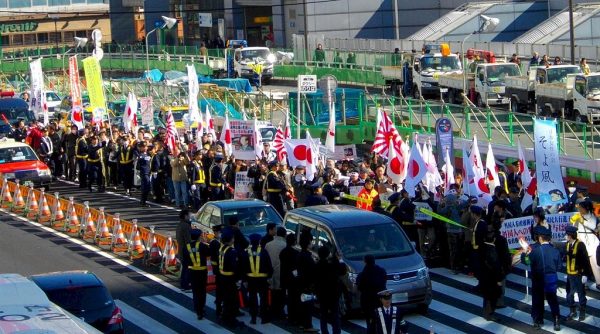They all belong to an ultra-right organisation named the Civil Association against Privileges for the Resident Koreans (Zainichi tokken wo yurusanai shimin no kai, or Zaitokukai). The high-school graduate, known by the pseudonym Sakurai Makoto, is the group’s president, the researcher his deputy.
The Zaitokukai organises events for participants to congregate at minority residential areas and blare threatening slogans and derogatory slurs via loudspeakers. The group, founded in 2007, can be regarded as the first hate group in post-war Japan. While conventional radical right-wing groups, or uyoku dantai, are also known for their noisy activities with military-style vans, their targets have been limited to institutions and influential figures. In contrast, the Zaitokukai’s main targets include immigrants and minorities. It has harassed resident Koreans, Filipinos, Chinese, Japan’s Burakumin minorities and even a major Buddhist faction, the Soka gakkai. In Japan, abuse and harassment against minority citizens and foreigners are on the rise. The Zaitokukai and similar but smaller groups have not yet hurt anyone physically, but the emergence of such groups is disturbing by itself.
What factors are behind the recent emergence of the movement? One conventional explanation is that people are anxious about identity as poor economic conditions since the 1990s foster strong hatred against minorities and foreigners. Journalist Yasuda Koichi has held this view, while Tessa Morris-Suzuki explains the Zaitokukai by associating it with the ‘soft repression’ of the regime led by rightist Prime Minister Abe Shinzo. In contrast, Beverley Anne Yamamoto argues the group could be a backlash against a new discourse of multiculturalism in Japan.
Yasuda Koichi’s report in particular makes clear the miscellaneous backgrounds of Zaitokukai members. The Zaitokukai’s official webpage stated that it had about 13,400 members as of June 2013. Most of these people seem to have been recruited through the internet. The cadres of the Zaitokukai explained to Yasuda Koichi that the core members of the group were web right-wingers who often posted on 2-Channel, a large internet forum that enables controversy because posters are perfectly anonymous.
Non-core members whom Yasuda interviewed told him that they accessed Nico nico douga (the Japanese equivalent of Youtube) to view Sakurai Makoto’s speeches, which openly use racial slurs and dirty words. To deepen their ‘knowledge’, non-core members then went to 2-Channel. According to Yasuda, the Zaitokukai people he interviewed believed they were the weak and downtrodden, who had been deprived of their rights as citizens, and had vowed to ‘fight’ against what they perceived as reverse discrimination in Japan.
The Zaitokukai are yet to take serious action to achieve their goals. A typical Zaitokukai cadre vaguely stated in May 2013 that they were thinking about petitioning politicians in the future, but did not show any clear plans. It seems they have not tried to systematically mobilise members and potential supporters for bloc voting. None of the cadres and members have run for elections. Zaitokukai people seem to be basically happy finding comrades and gathering in towns to intimidate and insult minorities and foreigners. This may be a reason why the Zaitokukai has not aligned with conventional moderate and radical right-wing groups, which usually have a clearer agenda.
The Zaitokukai movement shows no sign of abating, and they could become stronger by tapping into dissatisfaction in Japan. To be sure, there have been substantial counter-protests and demonstrations against the Zaitokukai. Some were led by existing leftist groups while others seemed to be organised by new, unknown groups. People have shown their anger by burning the group’s banners and by marching in parallel with the Zaitokukai, shouting ‘they are a racist group’. In June 2013, the Zaitokukai president and some cadres were arrested by police in a physical skirmish with members of the counter-movement.
But counter-movements are evidently insufficient to stop the Zaitokukai from harming minorities in Japan. The Zaitokukai are inflicting psychological damage on minorities and foreigners, and they are doing so legally. The legal framework to restrain hate speeches in Japan is very weak, so even when indictments against the Zaitokukai have been made, the courts have handled them as libel cases or invoked the lesser charge of ‘committing forceful obstruction of business’. Japan must protect its minorities by law and enact anti-discrimination laws.
Daiki Shibuichi is Assistant Professor at Centennial College, Hong Kong .

